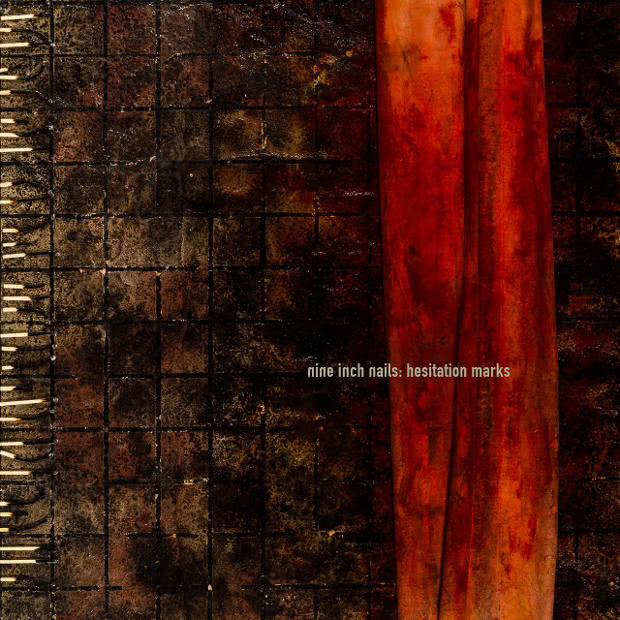“I surviiiiiived everything,” Reznor sings on ‘Everything’, easily the cheeriest – and in turn most polarising – cut in Nine Inch Nails’ gloomy, cathartic 25 year canon.
But as he hums with something approximating boastful irony or sheer glee (or both) over the greatest 3min synthpop hit that Regurgitator never wrote, it’s hard to disagree with him.
The 48-year-old has outgrown his broiling teenage angst and matured into his role as a musical elder in a way that few of his contemporaries have.
He’s gotten married, had kids, and if not quite overcome his personal demons, certainly found a way to not succumb to them. All the while finding great satisfaction in seeing how his self-forged career model, let alone his music, spread its influence across music of all shapes and styles. (Including inventing Yeezus 20 years ago, but that’s another tale.)
Which brings us to Hesitation Marks’ potential weakness but also its most surprising characteristic: it’s the work of a man who’s content.
If you’re the kind of NIN fan who comes to this album looking for the catharsis of an anguished ‘Hurt’ or the scare tactics of ‘Mr. Self Destruct’, the young, antagonistic Reznor who had sheer fucking fire in the belly, then prepare to adjust your expectations.
Reznor may have telegraphed that Hesitation Marks would harken back to his bleak, abrasive 1994 masterpiece, The Downward Spiral – right down to re-hiring cover artist Russell Mills, using the same font, and a suicidal title – but the reference points are conceptual, not sonic.
The trademark rage – the distorted drums, rabid guitars, and banshee wails in particular – are missing, but it’s not the domesticated, auto-pilot electronica of How to Destroy Angels that stand in its place either.
The record’s opening act – post-modernist anthem ‘Copy Of A’, ‘Came Back Haunted’, and ‘Find My Way’ – all released ahead of the LP’s official release, reassured Reznor hadn’t lost the tight grasp on his core elements: claustrophobic dread, lurching beats, peerless sound craftsmanship, that voice. “Reznor doesn’t need the fury and aggression any more; he’s found smarter and more interesting ways to sound majestically menacing.”
The full hour of music however, more reflects the atmospheric lessons learnt from his Oscar-winning film scores (indeed, old right-hand associate Atticus Ross co-produces, along with Alan Moulder) along with a sense of dynamics and grandiosity that befits rock arenas and not silver screens.
Reznor hasn’t bent himself this hard into new configurations, without breaking his musical identity, since 1999’s The Fragile.
But it’s not maximal like that sprawling double album; Hesitation Marks is reigned in. Tight, more considered. Minimal. Yet each track contains its own fortune of experimental surprises unlike any the musician has attempted before.
‘All Time Low’ shifts across slinky future funk with disco falsetto to sparkling, synth-dappled coda in its 6 minutes. ‘Satellite’ may contain the paranoid lyricism of 2007’s Year Zero, albeit in a far more svelte aural guise.
‘In Two’ rides a scatty yet cocksure rhythmic jam before scalping its peak into a haunting paean. And is that a horn section on ‘While I’m Still Here’!?
This unapologetic sense of adventure never actually compromises the unwritten Nine Inch Nails rules (though, some would argue that the sunny harmonies of the glossy ‘Everything’ crosses the line).
Even with its esteemed roll call of musical assistants: Adrian Belew, Lindsay Buckingham, Pino Palladino – you’d be hard-pressed to actually identify their contributions, as the sonic architecture has Reznor’s distinctive fingerprints all over it.
There’s bound to be schools of endless debate on the position of Hesitation Marks in the NIN hierarchy, the band’s legacy encourages, even dictates, such cult-like dissection.
Held together, and it does remarkably well, Hesitation Marks represents another accomplished experience, with all the progressions and strengths of his best work, just not the attack; it’s calmer in execution.
However, chiding Reznor for ‘mellowing out’ isn’t just wildly inaccurate, it misses the point. He doesn’t need the fury and aggression any more; he’s found smarter and more interesting ways to sound majestically menacing.
After all, he’s survived everything.

































